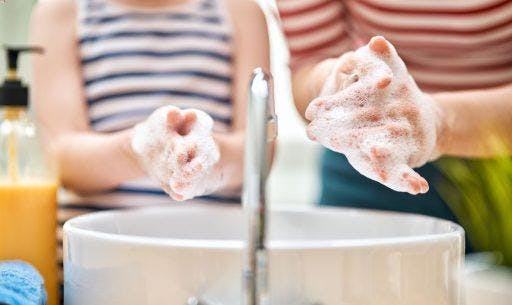To get a smile so radiant and bright, simply brushing your teeth is not going to cut it. You’ll need to introduce tweaks to your personal hygiene habits to achieve your desired results. Think: investing in clear aligners, switching to an electric toothbrush, or cleaning up your diet. Here, find out more ways to upgrade your current routine so you can flash your pearly whites with more ease and renewed confidence.
Why Is Personal Hygiene Important to Your Well-Being?

Personal hygiene is not just about looking and feeling your best. Good hygiene is key to achieving overall health and well-being. When you take care of your body, you not only build a stronger resistance to illnesses, but you also prevent the spread of viruses.
A study from the International Journal of Environmental Research and Public Health supported this link between excellent hygiene and sickness prevention. The results showed that personal hygiene accounts for 93.5% of upper respiratory tract infection prevention. Wondering why you’re always sick? It might be time to wash up so germs don’t stick.
Similarly, personal hygiene for your teeth is not only a gateway to a brighter, more dazzling smile. It also provides a safeguard for your overall health. Numerous studies have identified poor oral hygiene as a significant factor for systemic health issues.
Also, a good hygiene routine can be a form of self-care. By prioritising your physical needs, you protect your mental health. Simple acts like a nice, long shower or swiping on some lip balm can instantly transform your mood and boost your self-confidence.
Personal Hygiene Practices to Brighten Your Smile

Ready to level up your grooming game and pick up some good-for-you lifestyle habits? Here are some tips to boost your smile’s radiance and your overall health.
1. Improve your toothbrushing technique.
Everyone knows brushing and flossing are essential components of good oral hygiene. But to get a smile that will go the extra mile, you might want to rethink how you clean your teeth. The American Dental Association (ADA) has a specific recommendation: “Brush your teeth twice a day with a fluoride toothpaste for two minutes.”
The ADA also suggests brushing at a 45-degree angle against the gumline. Doing so will remove plaque from above and just below the gingival margin. And instead of sawing roughly back and forth, move your toothbrush gently in a circular motion to prevent eroding your teeth’s enamel.
Also, remember to change your toothbrush every three to four months. You can replace it sooner if the bristles become frayed or after you’ve recovered from an illness. Optionally, you can invest in an electric toothbrush with all the bells and whistles. Like a high-tech dance partner for your mouth, a mechanical toothbrush ensures every nook and cranny gets the attention it deserves.
Still prefer the easy accessibility of your manual toothbrush? Let the bristles speak for themselves. According to the International Journal of Dental Hygiene, soft-bristle brushes tend to cause less abrasive wear with increasing brushing force than medium-bristle brushes.
2. Don’t neglect your tongue.
Your tongue can also harbour bacteria and plaque, contributing to bad breath. So, include tongue scraping in your personal hygiene routine to give your mouth a total cleaning experience. Gently scrape your tongue from back to front to remove any residue, then rinse as necessary.
3. Consider therapeutic mouthwash.
Some may think the use of mouthwash is an unnecessary step. But it isn’t, really. A study from the British Dental Journal found that a therapeutic mouthwash containing active ingredients can help reduce plaque by 28.4%. Ater brushing your teeth, give your mouth a quick rinse with a solution targeting specific oral problems, from gum disease to halitosis.
4. See your dentist regularly.
Seeing your dentist (twice a year, suggests the ADA) is an opportunity to detect oral problems and address them immediately. For example, during the early stages of a cavity, you might not experience pain. You won’t even know it’s there, so you’ll be tempted to skip a dental appointment. However, leaving it untreated can worsen the condition and lead to other issues, which will cost you more time and money. So, never miss a visit, even when you think there’s no concern requiring your doctor’s attention.
5. Watch your diet.

For your smile to beam as brightly as possible, eat more “teeth-cleaning” foods. Go for crunchy fruits and vegetables containing high levels of water that can help keep your mouth hydrated and clean your teeth naturally. Conversely, avoid highly acidic foods and drinks that can contribute to teeth staining and destroy your enamel.
6. Use lip balm.
Pamper your lips with some TLC. Keep them moisturised to prevent dryness, cracking, and bleeding. Regular exfoliation can also prevent peeling and help you achieve a glowing appearance whenever you flash your smile.
7. Quit smoking.
Do you smoke? Stop. You may already be aware of the health risks of nicotine. But smoking won’t only damage your lungs; it’s also bad news for your mouth. Research by the American Dental Association attributed problems such as periodontitis, enamel erosion, and tooth staining to smoking. If you really want to brighten your smile, it’s time to quit lighting up.
8. Invest in dental aligners.
Have you been putting off fixing your dental misalignment and incorrect bite? Neglecting to seek treatment for your crooked or crowded teeth will give you more than just a haphazard smile.
Get the ultimate personal hygiene upgrade with ClearCorrect dental aligners. They’re the perfect solution for those who prefer a more comfortable and subtle approach to straightening teeth. Plus, they’ll make cleaning your teeth much easier and help you gain the confidence to navigate tricky social situations. Wins all around!
You don’t have to overhaul your current personal hygiene routine. Upgrades to your everyday habits can do a lot to brighten your smile. Be extra when brushing your teeth, see your dentist often, and kick your bad habits! When it comes down to it, the biggest reason to get you smiling is knowing that your act has never been cleaner. You’ve got this!
References:
An update on the efficacy of mouthwash use. (2022). British Dental Journal, 233(8), 693.
Hamza, B., Tanner, M., Körner, P., Attin, T., & Wegehaupt, F. J. (2021). Effect of toothbrush bristle stiffness and toothbrushing force on the abrasive dentine wear. International Journal of Dental Hygiene, 19(4), 355–359.
Home Oral Care. (n.d.). American Dental Association.
Leung, M., O’Donoghue, M. M., & Suen, L. K. P. (2022). Personal and Household Hygiene Measures for Preventing Upper Respiratory Tract Infections among Children: A Cross-Sectional Survey of Parental Knowledge, Attitudes, and Practices. International Journal of Environmental Research and Public Health, 20(1), 229.
Satō, T., Fukuzawa, Y., Kawakami, S., Suzuki, M., Tanaka, Y., Terayama, H., & Sakabe, K. (2021). The onset of dental erosion caused by food and drinks and the preventive effect of alkaline ionized water. Nutrients, 13(10), 3440.
Tobacco use and cessation. (n.d.). American Dental Association.
Toothbrushes. (n.d.). American Dental Association.
Zhang, J., Yu, J., Dou, J., Hu, P., & Guo, Q. (2021). The impact of smoking on subgingival plaque and the development of periodontitis: a literature review. Frontiers in Oral Health, 2.



